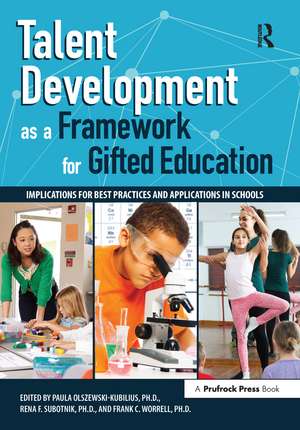Talent Development as a Framework for Gifted Education: Implications for Best Practices and Applications in Schools
Autor Paula Olszewski-Kubillus, Rena F. Subotnik, Frank C. Worrellen Limba Engleză Paperback – 15 oct 2018
Preț: 460.97 lei
Nou
Puncte Express: 691
Preț estimativ în valută:
88.23€ • 95.87$ • 74.16£
88.23€ • 95.87$ • 74.16£
Carte tipărită la comandă
Livrare economică 21 aprilie-05 mai
Preluare comenzi: 021 569.72.76
Specificații
ISBN-13: 9781618218148
ISBN-10: 161821814X
Pagini: 324
Dimensiuni: 178 x 254 x 22 mm
Greutate: 0.57 kg
Ediția:1
Editura: Taylor & Francis
Colecția Routledge
Locul publicării:Oxford, United Kingdom
ISBN-10: 161821814X
Pagini: 324
Dimensiuni: 178 x 254 x 22 mm
Greutate: 0.57 kg
Ediția:1
Editura: Taylor & Francis
Colecția Routledge
Locul publicării:Oxford, United Kingdom
Public țintă
Professional Practice & DevelopmentCuprins
Introduction Chapter 1: The Talent Development Framework: Overview of Components and Implications for Policy and Practice Chapter 2: Identification and Assessment in a K–12 Talent Development Framework Chapter 3: Programming for Talent Development Inside of School Chapter 4: Programming for Talent Development Outside of School Chapter 5: Curriculum and Instruction Within a Talent Development Framework Chapter 6: Serving Low-Income and Underrepresented Students in a Talent Development Framework Chapter 7: Performance Skills for Academic Talent Development: Integrating Sport and Performance Psychology Skills Into the Classroom Chapter 8: A Model of Talent Development From the World of the Visual Arts Inside and Outside of School Chapter 9: Mentoring and Developmentally Productive Environments to Support Talent Development Chapter 10: The Development of Creativity Within Talent Domains Chapter 11: Motivation: A Critical Lever for Talent Development Chapter 12: Evaluating the Effectiveness of Talent Development Programs Chapter 13: Addressing Misconceptions About the Talent Development Framework and Implications for Policy About the Editors About the Authors
Notă biografică
Paula Olszewski-Kubilius is currently the director of the Center for Talent Development at Northwestern University. She has more than 24 years of experience designing and conducting educational programs for learners of all ages including summer programs, weekend programs, distance learning programs, programs for underrepresented gifted students, as well as workshops for parents and teachers. She is active and has had leadership positions in national- and state-level advocacy organizations for gifted children. She was the recipient of the Early Scholar Award from the National Association of Gifted Children in 1987 and selected as the Esther Katz Rosen lecturer in 1997 by the American Psychological Foundation. She has conducted research and published more than 80 articles and book chapters on issues of talent development, particularly the effects of accelerated educational programs and the needs of special populations of gifted children She recently served as the editor of Gifted Child Quarterly and formerly was a coeditor of the Journal of Secondary Gifted Education. She has served on the editorial advisory board of the Journal for the Education of the Gifted, and Gifted Child International, and was a consulting editor for Roeper Review. She is a member of the Board of Trustees of the Illinois Mathematics and Science Academy and currently is a member of the boards of the National Association for Gifted Children and the Illinois Association for Gifted Children.
Rena F. Subotnik, Ph.D., is the director of the Center for Psychology in Schools and Education at the American Psychological Association. One of the Center's missions is to generate public awareness, advocacy, clinical applications, and cutting-edge research ideas that enhance the achievement and performance of children and adolescents with gifts and talents in all domains. She has been supported in this work by the National Science Foundation, the American Psychological Foundation, the Association for Psychological Science, the Dreyfus Foundation, and the Jack Kent Cooke Foundation. She is coauthor (with Paula Olszewski-Kubilius and Frank Worrell) of "The Talent Gap: The U.S. Neglects Its Best Science Students" (Scientific American),"Nurturing the Young Genius" (Scientific American Mind), and "Rethinking Giftedness and Gifted Education: A Proposed Direction Forward Based on Psychological Science" (Psychological Science in the Public Interest). She has also coauthored Methodologies for Conducting Research on Giftedness (with Bruce Thompson) and The Development of Giftedness and Talent Across the Life Span (with Frances Horowitz and Dona Matthews).
Rena F. Subotnik, Ph.D., is the director of the Center for Psychology in Schools and Education at the American Psychological Association. One of the Center's missions is to generate public awareness, advocacy, clinical applications, and cutting-edge research ideas that enhance the achievement and performance of children and adolescents with gifts and talents in all domains. She has been supported in this work by the National Science Foundation, the American Psychological Foundation, the Association for Psychological Science, the Dreyfus Foundation, and the Jack Kent Cooke Foundation. She is coauthor (with Paula Olszewski-Kubilius and Frank Worrell) of "The Talent Gap: The U.S. Neglects Its Best Science Students" (Scientific American),"Nurturing the Young Genius" (Scientific American Mind), and "Rethinking Giftedness and Gifted Education: A Proposed Direction Forward Based on Psychological Science" (Psychological Science in the Public Interest). She has also coauthored Methodologies for Conducting Research on Giftedness (with Bruce Thompson) and The Development of Giftedness and Talent Across the Life Span (with Frances Horowitz and Dona Matthews).
Recenzii
As Stambaugh so eloquently states, “Talent development is not a program or a service, but a philosophy—a way of investing in human capital and developing strengths” (p. 96). This philosophy guides the thirteen chapters in this book and is the basis for the practical recommendations and examples provided by each of the authors. Many readers will be familiar with the work of several of the chapter authors. Four of the chapters are actually authored by the book's editors and provide a richer understanding of the thinking behind their talent development framework.,Jennifer Ritchotte,Teachers College Record, 3/8/19
Descriere
"Talent development” is a phrase often used in reference to the education of gifted children. Recently, it has been presented by researchers to refer to a specific approach to the delivery of gifted education services.
